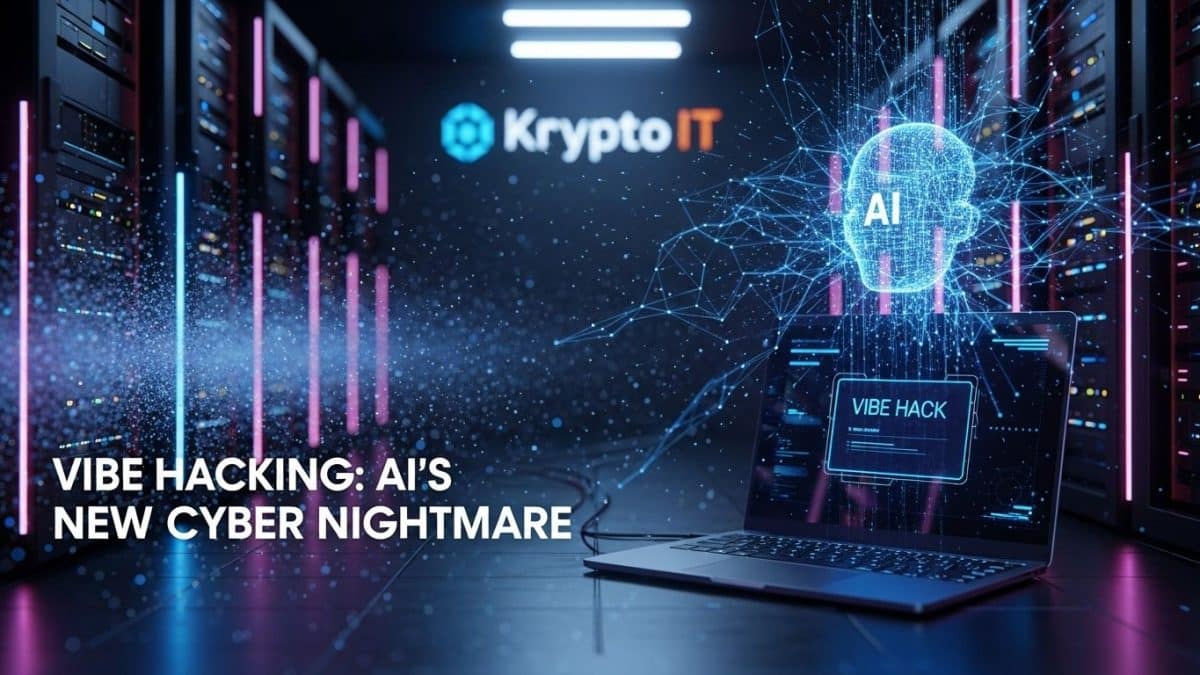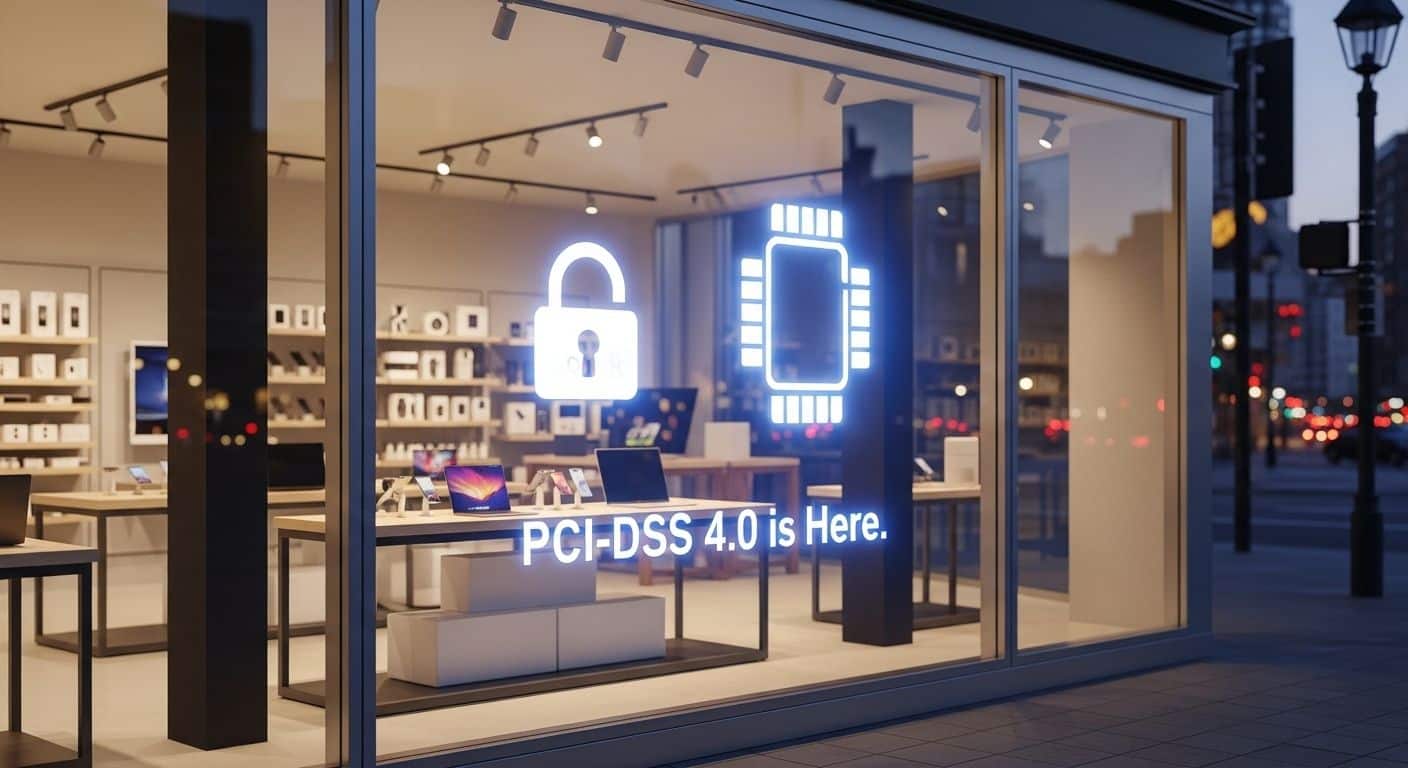
Remote Work: Securing Your Distributed Team
June 7, 2025
Ransomware 2.0: The Evolving Nightmare
June 10, 2025How Generative AI Fuels Sophisticated Scams & Exploits at Scale
We’ve discussed “vibe hacking” as a form of social engineering that manipulates human emotions (https://www.kryptocybersecurity.com/the-chilling-rise-of-vibe-hacking/). But what happens when you combine this psychological warfare with the immense power of Artificial Intelligence? According to recent insights, the rise of generative AI tools is ushering in a new, more terrifying era of “vibe hacking,” making it the next major cybersecurity nightmare for businesses of all sizes, including Small and Medium-sized Businesses (SMBs) in Houston.
This isn’t just about AI writing convincing phishing emails; it’s about AI building entire scam campaigns, crafting hyper-realistic deceptive content, and operating at a scale and speed previously unimaginable.
The Evolution: From Vibe Coding to Vibe Hacking
The term “vibe coding” emerged as a playful concept – using AI tools to quickly generate code based on natural language prompts, focusing on the desired “vibe” or outcome rather than meticulous syntax. It was a shortcut for innovation.
However, as with many powerful technologies, the same tools that enable rapid creation can also be misused for malicious purposes. This is where “vibe hacking” truly takes its sinister turn. When someone intentionally or carelessly misuses these powerful AI tools to create harmful, unethical, or illegal outcomes, that’s vibe hacking. And it’s no longer just a theory; it’s actively happening.
How AI Elevates ‘Vibe Hacking’ to a Nightmare Level
The “AI nightmare” aspect of vibe hacking stems from the generative AI’s ability to automate, personalize, and scale deception:
- Massive Scale and Speed of Content Generation:
- Automated Scam Creation: Attackers can use AI to generate entire scam campaigns in minutes. This includes highly persuasive phishing emails, fake websites, deceptive text messages, and even infrastructure for data theft.
- Rapid Iteration: AI allows criminals to quickly test and refine their scam messages and tactics, learning what works best to bypass defenses and emotional barriers. This adaptive capability makes them incredibly resilient.
- Hyper-Realistic Deepfakes and Synthetic Media:
- Voice Clones: AI can perfectly replicate voices from a small audio sample, making “CEO fraud” or “emergency calls” indistinguishable from the real thing. Imagine a scammer calling your finance department with your CEO’s exact voice, demanding an urgent wire transfer.
- Deepfake Videos: While less common for everyday SMB attacks due to complexity, the technology for realistic video manipulation is advancing rapidly, posing future risks for impersonation in video calls or internal communications.
- Sophisticated Phishing Images: AI can create highly convincing logos, branding, and graphical elements for fake websites and emails, making them almost impossible to discern from legitimate ones.
- Personalized and Contextualized Deception:
- Advanced Social Engineering: AI can process vast amounts of public information (from social media, company websites, news articles) to create hyper-personalized phishing messages that exploit an individual’s role, projects, interests, or recent activities. This goes far beyond generic “urgent payment” emails.
- Emotional Targeting: AI models can be prompted to craft messages designed to evoke specific emotions – urgency, fear, curiosity, empathy, or flattery – to lower a victim’s guard and induce action.
- Lower Barrier to Entry for Cybercriminals:
- “No-Code” Cybercrime: The most alarming aspect is that attackers no longer need to be coding experts. They just need to know how to “talk” to AI. With simple prompts, even novice cybercriminals can generate complex attack infrastructure and content, democratizing sophisticated cybercrime.
- Accessibility of Tools: Many generative AI tools lack strong protective guardrails against misuse, making them easily exploitable for malicious purposes.
- Erosion of Trust and Reality:
- As AI-generated fake content becomes indistinguishable from real content, it creates a pervasive sense of distrust. This “nothing is real” scenario makes it harder for individuals and organizations to verify legitimate communications, slowing down operations and increasing paranoia.
The Impact on Houston SMBs
For SMBs in Houston, this rise of AI-powered vibe hacking presents a heightened threat because:
- You’re a Target: You may not be a nation-state, but your client data, financial resources, and position in a supply chain make you a valuable target.
- Limited AI Expertise: Most SMBs don’t have in-house AI experts to detect or counter these advanced, AI-generated threats.
- Human Vulnerability: Your employees remain your weakest link, and AI makes it exponentially easier for attackers to exploit human trust and psychological biases.
- Rapid Adaptation: Attackers can adapt their methods faster than ever, making static security measures quickly obsolete.
Defending Against the AI-Powered Vibe Hacking Nightmare
Combating this evolving threat requires a multi-faceted and forward-looking approach:
- Elevated Security Awareness Training (with an AI Focus):
- Train employees specifically on AI’s role in creating deepfakes, sophisticated phishing, and personalized scams. Show them examples.
- Emphasize “out-of-band” verification for any unusual or urgent request, especially financial transactions or data sharing (e.g., call the sender on a known phone number, don’t just reply to the email).
- Foster a culture of skepticism and reporting: “If it feels off, it probably is. Report it.”
- Robust Email and Communication Security:
- Deploy advanced email security solutions that leverage AI and machine learning to detect subtle anomalies, deepfake indicators, and sophisticated phishing patterns.
- Implement DMARC, SPF, and DKIM to prevent email spoofing.
- Mandatory Multi-Factor Authentication (MFA) Everywhere:
- Even if AI helps a scammer get credentials, MFA provides a critical second layer of defense.
- Strengthened Internal Protocols:
- Re-evaluate and strictly enforce internal verification processes for all financial transactions, data access requests, and executive directives. Implement multi-person approval for high-risk actions.
- Invest in AI-Powered Security Tools:
- Consider security solutions that use AI to detect anomalous behavior, identify deepfakes in voice/video, and analyze communication patterns for signs of sophisticated social engineering.
- Stay Informed on AI Threat Landscape:
- Work with cybersecurity partners who are actively tracking the evolution of AI-powered threats and can provide up-to-date guidance and solutions.
The rise of AI-powered vibe hacking represents a significant escalation in the cybersecurity arms race. For Houston SMBs, ignoring this new reality is a perilous gamble. Krypto IT is at the forefront of understanding and combating these advanced threats, leveraging our expertise to equip your business with the proactive defenses needed to protect your people and your data.
Don’t let the power of AI be used against you.
Contact us today to schedule a free consultation and fortify your defenses against the chilling new reality of AI-powered vibe hacking.




